In case someone is interested in reading some Crusader Kings II fan fic, I've just started an AAR over at Paradox's AAR forums.
I'm writing about the kings of Norway, and here is the first chapter:
Haraldr, the first of the Norwegian kings, is well known for any Norwegian citizen. When he set out to unite the Norwegian petty kingdoms, he famously swore to not cut his hair before he had succeeded in doing so. After gathering his host, he set out on a long journey, a journey that left the Viking world changed forever.
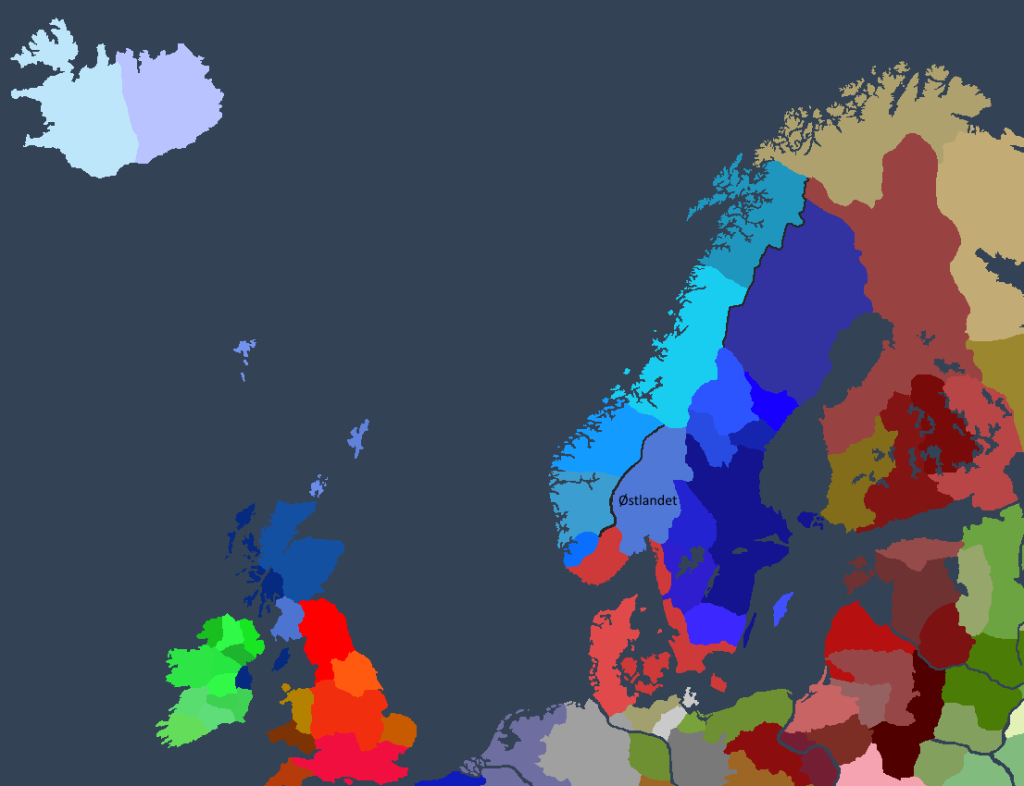
The lands held by the petty king of Østlandet, Haraldr, in 867.
Family
Haraldr married only one woman, the love of his life, Røgnhildr. He was a lustful man however, and through his life he had at least five concubines. Four were brought in from neighbouring Viking lands, but the fourth, Wynnflæd, was a Christian slave bought from a petty kingdom on the British Isles.
The first of the concubines, Astrid, faced the wrath of the then petty king when she bore the child of a neighbouring noble, and ended her life in the dungeons of his castle.
With his wife and his concubines, Haraldr bore nine children that we know of:
Halfdan
Dyre
Thorolfr
Kraka
Tyke
Asta
Thordr
Saga
Ormr
The second of these children, Dyre, would ultimately succeed him as the king of Noregr, or Norgesveldet as the empire of medieval Norway is known as to modern day Norwegians.
His reign
In a lightning campaign of just eight years, Haraldr united all of modern day Norway, except the southern tip, which was held by the mighty petty kings of Jylland, in modern day Denmark.
He dared not yet declare himself king of a united Norway though, as according to the sagas he was warned by Odin himself that he had yet to prove himself worthy of the title. Not content with merely controlling the Norwegian lands, he then set his eyes on the lands of the Swedes. The northern Swedish tribes fell fast, but in 874 the warrior king suddenly changed focus and went in Viking to the shores of the British Isles.
For four years he looted the country side of the British kingdoms, and in 878 the sagas tell that Odin himself visited the king’s tent and gave him his blessings. That same year the Norwegian jarls assembled on the ting and declared Haraldr I “Fairhair” the king of Noregr.
The following twelve years, the king seemingly changed his ways and did little of warring. Emissionaries were sent to the settlers of the islands of the Vikings in the North Sea, and all but one accepted him as their lawful king.
Old habits die hard though, and in 890 a massive invasion of the British Isles were initiated, led by Haraldr himself. After securing a beachhead in northern Scotland, all of the Catholic counts of Ireland was issued an ultimatum; submit or die. All counts refused to submit, and war engulfed the Emerald Island for the next decade. The sole peaceful place was the small jarldom in the east, which was led by a relative of Haraldr.
The campaign was a huge success, one by one the counties’ armies were defeated and their lands taken. However, in mid 898 the conquering army was met by a united host of equal strength, and during battle the Viking king was hit by an arrow. Hours later the king was dead, his armies fleeing and the kingdom laid in the hands of his sickly heir and son, Dyre I.
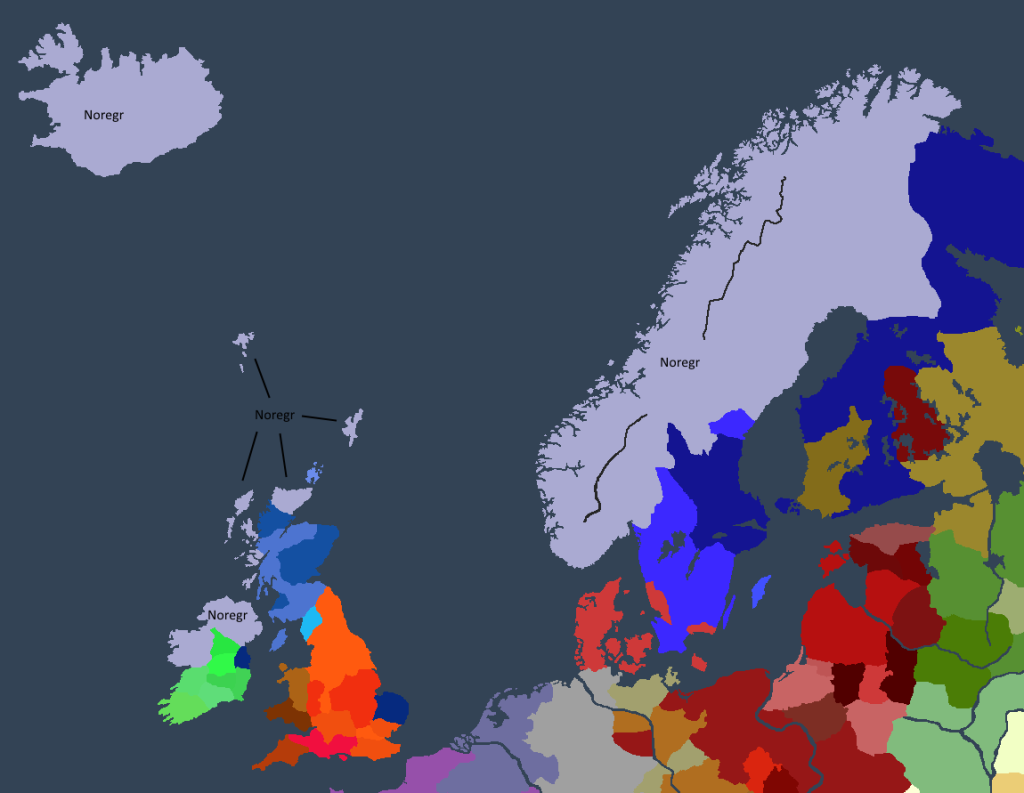
Norgesveldet at the time of king Haraldr I’s death in 898.
Aftermath
Contemporary Christian sources show a mixed sense of dread and awe for the conquering Viking king. Within a few decades, the divided tribes of the North was to a large degree united under one mighty warrior, and the Catholic bastion of Ireland was all but fallen to the invaders.
To modern day Norwegians, Haraldr is seen as one of the most important Norwegian ever, uniting their country for the first time and laying the groundwork for the modern nation state.

I'm writing about the kings of Norway, and here is the first chapter:
Haraldr I «Fairhair»
(866-898)
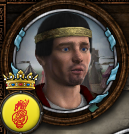
(866-898)

Haraldr, the first of the Norwegian kings, is well known for any Norwegian citizen. When he set out to unite the Norwegian petty kingdoms, he famously swore to not cut his hair before he had succeeded in doing so. After gathering his host, he set out on a long journey, a journey that left the Viking world changed forever.

The lands held by the petty king of Østlandet, Haraldr, in 867.
Family
Haraldr married only one woman, the love of his life, Røgnhildr. He was a lustful man however, and through his life he had at least five concubines. Four were brought in from neighbouring Viking lands, but the fourth, Wynnflæd, was a Christian slave bought from a petty kingdom on the British Isles.
The first of the concubines, Astrid, faced the wrath of the then petty king when she bore the child of a neighbouring noble, and ended her life in the dungeons of his castle.
With his wife and his concubines, Haraldr bore nine children that we know of:
Halfdan
Dyre
Thorolfr
Kraka
Tyke
Asta
Thordr
Saga
Ormr
The second of these children, Dyre, would ultimately succeed him as the king of Noregr, or Norgesveldet as the empire of medieval Norway is known as to modern day Norwegians.
His reign
In a lightning campaign of just eight years, Haraldr united all of modern day Norway, except the southern tip, which was held by the mighty petty kings of Jylland, in modern day Denmark.
He dared not yet declare himself king of a united Norway though, as according to the sagas he was warned by Odin himself that he had yet to prove himself worthy of the title. Not content with merely controlling the Norwegian lands, he then set his eyes on the lands of the Swedes. The northern Swedish tribes fell fast, but in 874 the warrior king suddenly changed focus and went in Viking to the shores of the British Isles.
For four years he looted the country side of the British kingdoms, and in 878 the sagas tell that Odin himself visited the king’s tent and gave him his blessings. That same year the Norwegian jarls assembled on the ting and declared Haraldr I “Fairhair” the king of Noregr.
The following twelve years, the king seemingly changed his ways and did little of warring. Emissionaries were sent to the settlers of the islands of the Vikings in the North Sea, and all but one accepted him as their lawful king.
Old habits die hard though, and in 890 a massive invasion of the British Isles were initiated, led by Haraldr himself. After securing a beachhead in northern Scotland, all of the Catholic counts of Ireland was issued an ultimatum; submit or die. All counts refused to submit, and war engulfed the Emerald Island for the next decade. The sole peaceful place was the small jarldom in the east, which was led by a relative of Haraldr.
The campaign was a huge success, one by one the counties’ armies were defeated and their lands taken. However, in mid 898 the conquering army was met by a united host of equal strength, and during battle the Viking king was hit by an arrow. Hours later the king was dead, his armies fleeing and the kingdom laid in the hands of his sickly heir and son, Dyre I.

Norgesveldet at the time of king Haraldr I’s death in 898.
Aftermath
Contemporary Christian sources show a mixed sense of dread and awe for the conquering Viking king. Within a few decades, the divided tribes of the North was to a large degree united under one mighty warrior, and the Catholic bastion of Ireland was all but fallen to the invaders.
To modern day Norwegians, Haraldr is seen as one of the most important Norwegian ever, uniting their country for the first time and laying the groundwork for the modern nation state.


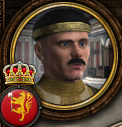
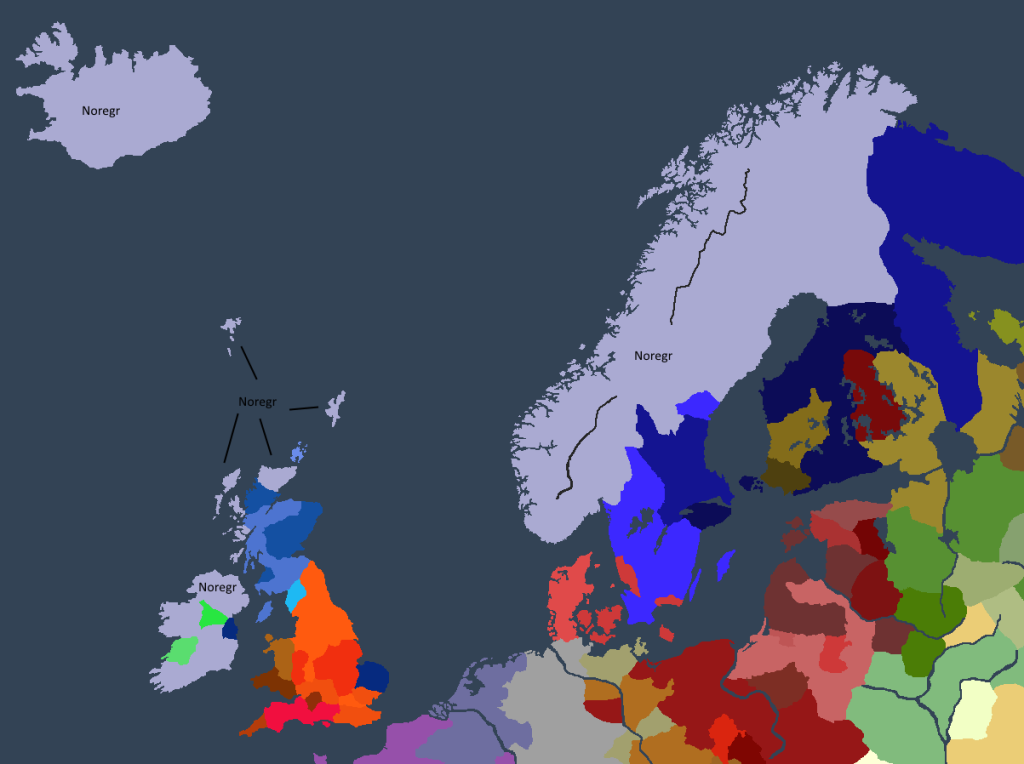

Comment